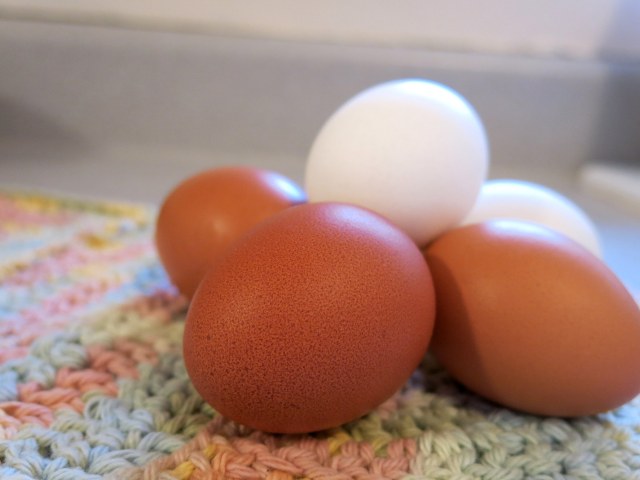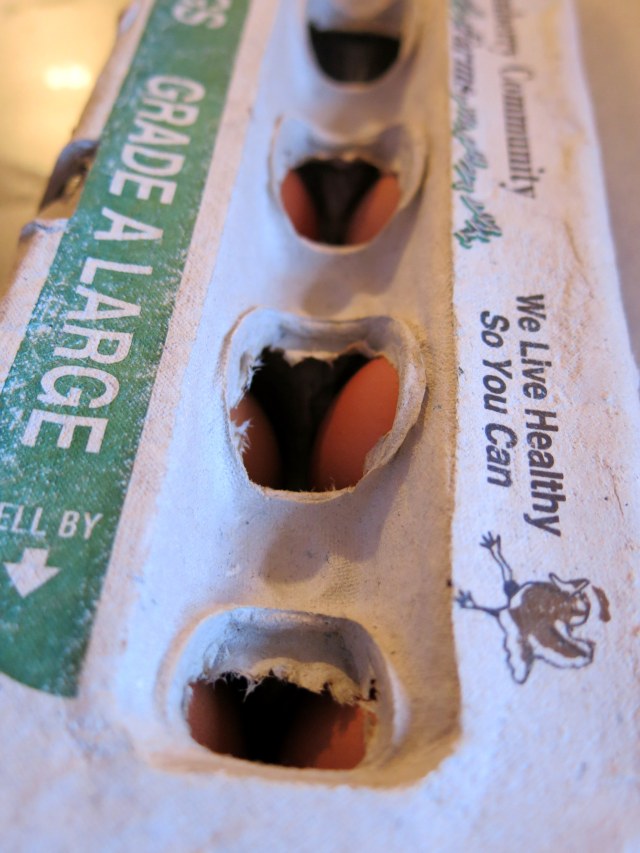Celebrating The Small Victories In Eating Well, Switching From Commercial to Pasture (free-range) Eggs, Part 2
The Nature of Rest
What the Bible and Creation Teach Us About Sabbath Living
Intentional Parenting
Nature Studies
Apologetics
Adventure
Free Resource
Entrepreneurship
Homeschooling
Faith
Books
Categories
Master Naturalist, Bible teacher, author, wife, and mama of four! Join our adventures of discovering God while adventuring in creation.
I'm Eryn
Hey there!
Listen Now
Order now
Celebrating The Small Victories In Eating Well
On Thursday I began sharing a conviction I’ve had recently to celebrate the small victories in life. When we faced a recent setback in eating whole foods, I looked back to realize that despite the setback, we had a whole lot of small victories to celebrate! One of those was the switch we made from eating commercial eggs to eating eggs from hens raised on pasture.
(Read part 1 of this post here)
I start most mornings with two fried over-easy eggs. Depending on the origin of your eggs, that could either be an exceptionally healthy start to a day, or a poor one. With so many labels adorning eggs cartons these days, simply buying eggs isn’t so simple any more. Today I want to dive in a bit further and attempt to unravel the confusion created by the various labels and claims found on egg cartons.
Unraveling The Confusion Surrounding Our Modern Day Carton Of Eggs
Below are some of the different labels and claims you might find on egg cartons from your grocery store. From my research, I’ve rated them from lowest to highest quality.

An industrial agricultural confinement system used for commercial egg production. Image Source: farmsancturay.org
8. Commercial Eggs
These are your run-of-the-mill white commercial chicken eggs. Chickens are kept in confined cages. These chickens live in extremely unhealthy and inhumane conditions, which is reflected in the inferior flavor and health of their eggs. These eggs have an extremely high content of Omega-6 fats, which are very harmful in excess (more on that later). So if these are the eggs you decide on, consider enjoying them in moderation to avoid consuming too many Omega-6 fatty acids.

The term “Natural” is not regulated, and should all together be ignored on packaging. Read the ingredients list instead!
7. “Natural”
Just like in every other food product, this term means nothing.
6. Vegetarian
This may sound good, but chickens were created as omnivores and thrive when they can forage for both plant materials and insects. If a chicken is truly vegetarian, that means it can not eat bugs, which guarantees that these chickens never see the outdoors. “Vegetarian free-range” eggs are a lie.

“Cage-Free’ means simply that. They are not in a cage. Image Source: http://wildramp.wordpress.com/glossary-of-terms/
5. Cage-free
This means nothing other than that the chicken is not confined to a cage. It can still live its entire life confined in a barn, piled on top of other chickens.

Free-range of pasture, or free-range of the barn? Image source: http://www.mailonsunday.co.uk/news/article-2508173/16-000-free-range-chickens-crammed-shed-NEVER-daylight.html
4. Free-range
This does not guarantee that a chicken is free to roam outside. This term is loosely regulated, and only requires that there is a small door somewhere within the barn that the chicken may occasionally use (if it finds it), to peek outside for a little bit.
3. Omega-3 Eggs
These chickens are fed a vegetarian diet of plant materials, flax seed, grains, and sometimes seaweed. These eggs can have 4x the omega-3 fatty acids of commercial eggs. However, the Omega-3 label is not regulated, and amounts and types of Omega-3s vary. An “Omega-3” claim speaks nothing to the living conditions of the chickens, but at least some care is given to what they are eating.
2. Organic
These chickens are fed organic feed. No antibiotics are used on the chickens unless in the case of an infectious outbreak (in which case I don’t want their eggs, anyways…) These chickens are not confined to cages, and are allowed access to the outdoors, but are not guaranteed to be raised on pasture.
1. Pasture (Truly free-range)
These chickens are happy chickens! They live just as they were created to—outdoors foraging for their natural diet of plant materials and insects. They produce the best quality, most delicious, and most healthful eggs.
How Much More Omega-3 Fatty Acids Do Pasture Eggs Have?
There are two types of omega fatty acids in eggs.
- Omega-3 fatty acids, which are very good for us
- Omega-6 fatty acids, which are not inherently bad, but are very harmful in excess.
Nina Planck in her book, “Real Food” explains that “The ratio of omega-6 to omega-3 fats in pasture eggs is ideal (about 1:1) while an indoor egg has almost 20 times more omega-6 than omega-3 fats.”
This is big. Spending twice as much on pasture eggs doesn’t seem like such a big sacrifice when you take a look at these numbers. Pasture eggs contain about 10 times more Omega-3s (the good omega fats) than chickens raised indoors. Even the Omega-3 enhanced eggs (#3 on our list) only had 4x more Omega-3s than commercial, making pasture eggs the best option.
By switching to pasture eggs, my family is spending just over twice as much as we used to (an increase of about $3.80 for our 2/dozen eggs a week). I will happily shell out an extra $3.80 a week to feed my family a much tastier egg that delivers 10 times the health benefits of a commercial egg from a factory farm chicken. Now that’s a victory to celebrate!
In short, pasture eggs, on average, have 10 times more healthy fats, and twenty times less potentially harmful fats than commercial eggs.
In The End, It’s Miles That Matter
During the long voyage eggs make from hen to super market, all of these terms can become lost in translation. That’s why it’s best to simply shorten the distance the eggs travel. By buying eggs from a local farm, you have the opportunity to know exactly where your eggs are coming from, and the living conditions of hens that are producing them. Once again, local is best.
The Convictions Behind Our Creed Of Food
So what is the conclusion? What eggs will you buy? This, like every other area of food, is something we must determine for ourselves based on sound research and facts.
When it comes to the quality of foods, or lack thereof, where do we draw the line in what we consume? When will the convictions we have about food, produced by the facts we gather, change the way we eat? And how far does a food have to be separated from its natural origins before we will decide it should not be a part of our regular diet? These are the questions we have to ask when creating our creed of food. It’s the answers to these questions that determine how we will eat to protect our bodies, and what kind of legacy of health we will create for our families.
Sources:
“Real Food”, Nina Planck
http://www.omegavia.com/omega-3-foods-eggs/
http://www.determineyourhealth.com/tag/free-range-eggs/
http://www.squidoo.com/differences-in-eggs
learn more
Raising kids stirs something deep in our souls — an innate knowing that our time is finite. Taking my kids outside in creation, I’m discovering how to stretch our time and pack it to the brim with meaning. God’s creativity provides the riches of resources for teaching the next generation who He is and how He loves us. Join our adventure and discover inspiration and resources for refusing rush, creating habits of rest, living intentionally, and making the most of this beautiful life!
I'm Eryn, Master Naturalist, Author, & Bible Teacher
Hey there!
Receive free inspirational resources for refusing rush, creating habits of rest, parenting with intentionality, and teaching our kids who God is through what He has made!
Inspired
Be
Brand + Website by Amarie Lael Design | TERMS & CONDITIONS + PRIVACY POLICY | Copyright 2011 - 2026 Eryn Lynum
Contact
Speaking & media
About
Books
Shop
Videos & Interviews
Email List
Stories
Free Downloads
Resources
Home
@erynlynumauthor
The Nature of Rest
What the Bible and Creation Teach Us About Sabbath Living
Now Available!
Order
X
Signed Copy




How do I know which eggs are local in my supermarket if I haven’t met any of our local farmers at the farmers market this past summer?
Dwan, thanks for the question, it’s a great one! When we can’t get to the farmer’s market, or run out of eggs before the weekend market, we found local farm fresh free-range eggs from our grocery store. They caught my eye with the “Produced Locally” claim on the carton. Sure enough, they are produced by a licensed community of Amish farmers about a hour and a half from us. They are truly free-range, we just had to do a bit of research. My point is that you can find them, but may need to do a bit of research. Truly local, free-range eggs will be much easier to find at a health or whole food market. You can also use websites such as http://www.localharvest.org/ to find locally sourced food. Just enter in “Eggs” under product, and then your zip code in location, and you should find some very helpful detailed information on where to find eggs (and other local foods) from farmers in your area. I hope this helps!